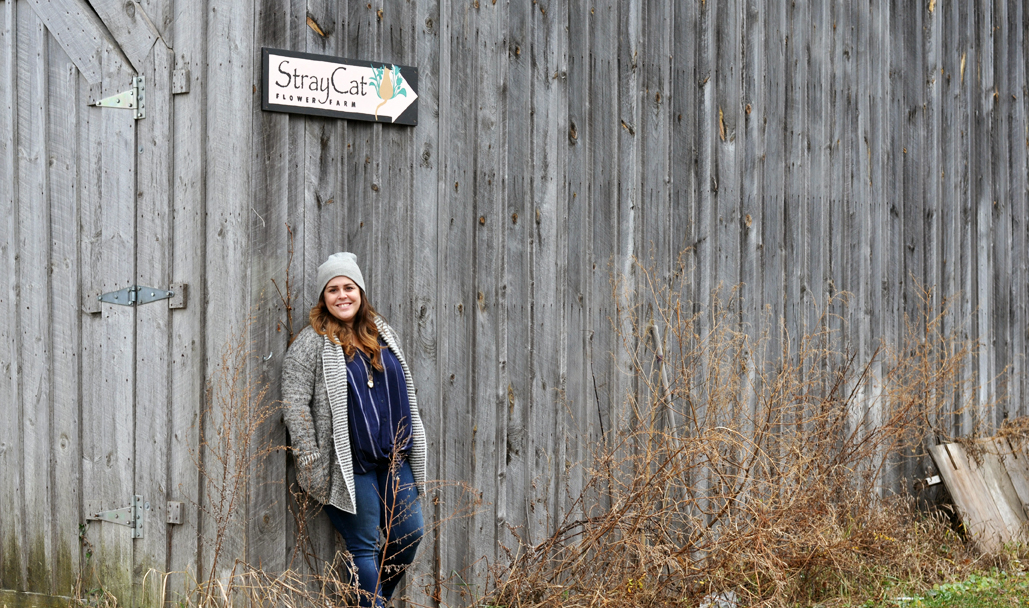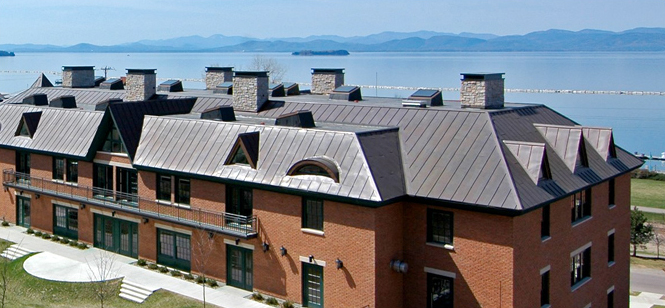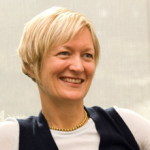Kim Bayer, center, of the Washtenaw Food Hub.
By Mariette Landry
While working as project manager and co-founder of the Washtenaw Food Hub, a 16-acre historic farm located north of Ann Arbor, Mich., Kim Bayer enrolled in UVM’s 10-month Food Hub Management Professional Certificate Program. “There were so many great things about the program,” she says, “like the chance to visit and see inspiring models in action—the Intervale, the Mad River Food Hub, the Food Ventures Center—and the opportunity to learn from experts and colleagues from across the country.”
Among the best of what she took home from the program was “the foundation for competency in more than a dozen areas that are necessary to manage and run a food hub, including finance and accounting, business planning, marketing, product development, distribution, food safety, risk management, technology, and more,” Bayer says. “In addition to a framework for conceptualizing the big picture, I’ve grown my skills in each of the competencies and I have resources for developing further.”
A Triple-Bottom-Line Approach
With the ongoing restoration of Washtenaw Food Hub’s 1915 farmhouse and 10 agricultural buildings for food safety and energy efficiency—including a new 150-kilowatt solar array—the site is used to develop a community of triple-bottom-line farm and food businesses, with an educational center and demonstration site for sustainable principles and closed-loop energy systems with a zero-waste goal.
“We currently have 12 businesses at the Food Hub that share our vision of working with local farms and creating health for our community,” Bayer says.
Washtenaw’s triple-bottom-line approach to food systems stands apart from the way many food hubs operate. “The majority of food hubs around the country focus on the aggregation and distribution of food,” Bayer says, “and most of them are run as nonprofits.” The Washtenaw Food Hub’s strategy includes its independence from the ups and downs of grant cycles. “We didn’t see that as a sustainable business model, so we’re incorporated as an LLC, and the starting point for our business is based on leasing our agricultural processing kitchens, rather than on aggregating and distributing food.”
With a focus on “the social, environmental, and economic impacts we can make”—the triple bottom line—Bayer explains that Washtenaw seeks to attract “like-minded businesses and the community that understands that every choice we make has effects that are about more than money. We’re all about relationships,” she says.
And the value of these relationships is undeniable. Washtenaw Food Hub is situated in its greenbelt location because of Ann Arbor Township’s Small Farms Initiative, an effort to preserve agricultural land for food production close to residents. In 2012 it received a $200,000 grant from the Michigan Department of Agriculture and Rural Development to build additional agricultural processing kitchens and large-scale food storage units to increase capacity and develop market channels for local farms to grow and sell healthy food. “These commercially licensed kitchens are currently in operation, and two are available to rent hourly,” Bayer says. “Our vision is to accelerate growth for food businesses sourcing food from local farms.”
Community Support
Support from the Michigan Food Hub Network and the MSU Center for Regional Food Systems (CRFS) has also been instrumental in Washtenaw’s success. “Every state needs a food hub network like this,” Bayer says. “CRFS schedules quarterly food hub network meetings around the state, brings stakeholders and policy makers together, and develops communication and collaboration in an incredibly powerful way. I don’t think we’d be where we are without this amazing resource.”
The driving force behind Washtenaw Food Hub’s vision, Bayer says, “is the desire to create an alternative to the industrial food paradigm and create opportunities for people to engage with their food system in meaningful ways. We want to provide ways for people to learn practical skills, understand the complexity of all aspects of the food system, restore ecosystems, create health, and protect and care for our place.”
Washtenaw Food Hub now hosts community workshops and events, provides tours, and partners with academic researchers, including a current project to evaluate Kernza, the perennial wheat developed by the Land Institute in Kansas. “As we develop,” Bayer says, “we’ll add additional business units, including retail, a production farm and U-Pick operation, education and events, and aggregation and distribution.”
Washtenaw’s triple-bottom-line future looks promising. Can it serve as a model for the future of food hubs across the country? “As we know,” Bayer says, “each food hub is unique in developing to meet the needs of its own community. I would hope that other food hubs are able to promote systemic health for individuals, the environment, and the local economy, as well as develop sustainable business models that make the current extractive industrial food paradigm obsolete.”
Mariette Landry is a senior editor and writer for UVM Continuing and Distance Education.





